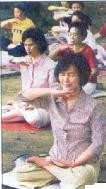(Clearwisdom.net) United Daily News reporter Chang Ren-hao reported on September 17, 2002: Among all kinds of morning exercises in Taipei, there are always groups of people practicing Falun Gong. The practitioners emphasize that Falun Gong is not a sport or a religion. It pays equal attention to both exercises and cultivation of mind and has big differences from other morning exercises.
Chang Rui-lan, who has practiced Falun Gong for several years, said that Falun Gong's movements are similar to Qigong, but different from it, Falun Gong emphasizes cultivation of the mind and the body. People practice Falun Gong at over a dozen parks in Taipei. For example, at Huxiao Park, people practice it from 4:50 a.m. to 7:00 a.m. Falun Gong has five sets of exercises, including four standing exercises and one sitting exercise. It is suitable for people of all ages ranging from elementary pupils to eighty-year-old adults. She has practiced for five years. At the beginning, it was like calisthenics, but later she could feel strong energy flowing once she started doing the exercises.
Falun Gong consists of five sets of movements, which are: Buddha Showing A Thousand Hands Exercise, Falun Standing Stance Exercise, Penetrating Two Cosmic Extremes Exercise, Falun Heavenly Circulation Exercise and way of Strengthening Divine Powers Exercise. The first four movements are practiced while standing; the fifth one requires sitting with both legs crossed.
Lim Yan-ling and several other practitioners at Ronghsing Park said that the five sets of movements are easy to learn. Some people can learn to practice the five sets in a couple of days. The five sets of exercises can be practiced consecutively or selectively. It is very flexible.
Hung Chi-hung, who volunteers to teach the exercises, said he used to practice Taiji for many years, but now he has changed to practice Falun Gong, as practicing Falun Gong generates huge energy, opening up all the energy passages throughout the body and activating cells.
Chang Ching-hsi is a professor of economics at National Taiwan University and the head of the Taiwan Falun Dafa Association. Chang Chin-hwa is an associate professor of journalism at the same university and a news coordinator of Taiwan Falun Dafa Association. Chang Chin-hwa said that Falun Gong is like Qigong, the movements are gentle and smooth, but fundamentally it is the Buddha Fa cultivation. Falun Gong emphasizes cultivation of the mind and the body and well being of the body, mind and soul. Many professors and students at Taiwan University have learned Falun Gong.
"Falun Gong is a belief, believes in a truth, but not a religion." Chang Chin-hwa explained. She has practiced for three years, and she feels healthy physically, mentally and spiritually though sometimes she is stressed from her work.
Anyone who is interested in learning Falun Gong, please visit the website www.falundafa.org.tw. From there you can find information such as addresses, contact persons and practice times for over a hundred practice sites in different districts of Taipei.
Caption: Falun Gong includes exercise and cultivation of the mind. Every morning, many people can be seen practice Falun Gong in many parks. (Reporter Lim Junliang/photograph)
All content published on this website is copyrighted by Minghui.org. Minghui will produce compilations of its online content regularly and on special occasions.










